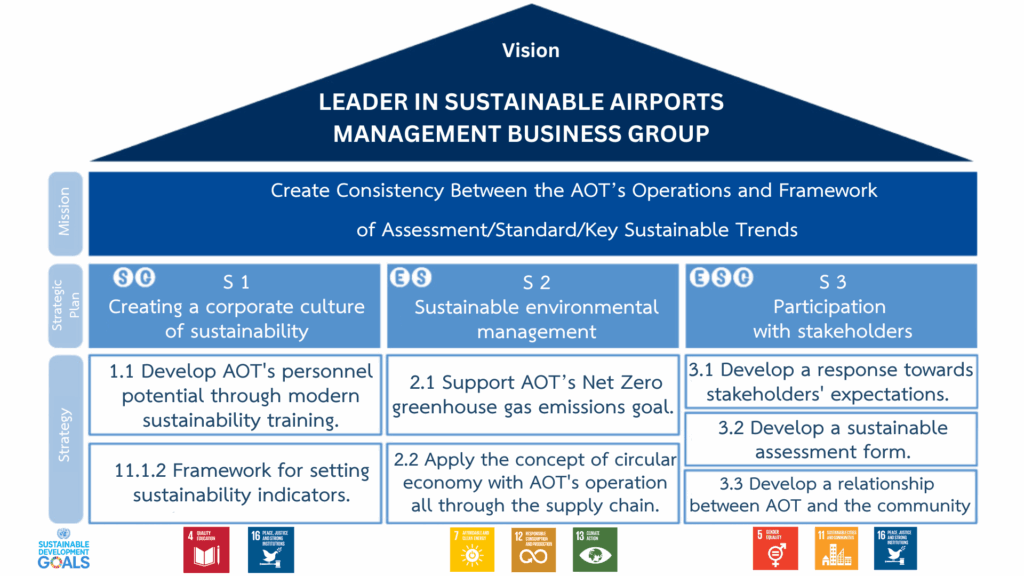AOT's Sustainable Development
AOT operates its sustainable development initiatives under the conceptual framework of "Corporate Citizenship Airport," positioning itself as a responsible corporate citizen and community neighbor. The objectives are to foster sustainable growth through responsible business practices, cultivate robust relationships and trust among both domestic and international stakeholders, and create balanced value across economic, social, and environmental dimensions.
Sustainability Governance Structure
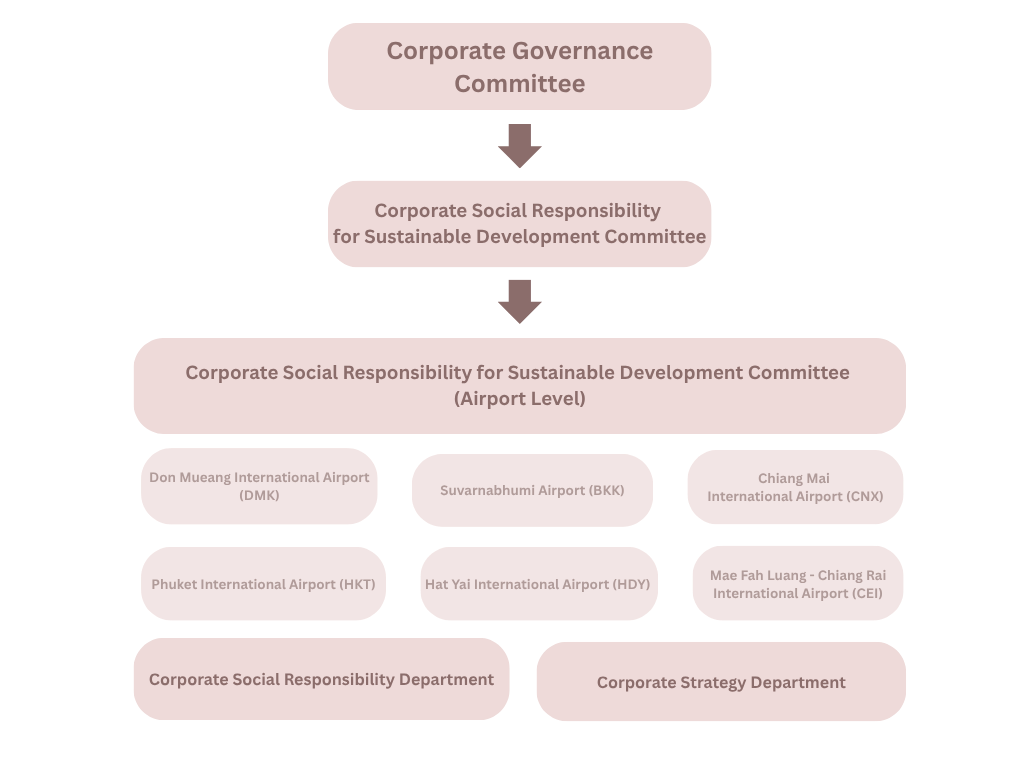
Corporate Governance Committee
1. Policy Development and Strategic Framework
Formulate comprehensive corporate governance policies and corporate social responsibility frameworks that drive sustainable development initiatives within AOT, presenting these strategic blueprints to the AOT Board of Directors for formal ratification and implementation authorization.
2. Advisory and Best Practice Facilitation
Provide strategic counsel and disseminate exemplary governance practices to the AOT Board of Directors, ensuring adherence to corporate governance principles established by the State Enterprise Policy Office, the Securities and Exchange Commission, the Stock Exchange of Thailand, as well as internationally recognized governance standards and best practices.
3. Integrated Corporate Social Responsibility Promotion
Foster organizational commitment to corporate social responsibility across AOT’s operations, encompassing a holistic integration of economic, social, and environmental dimensions throughout all corporate functions and strategic initiatives.
4. Continuous Monitoring and Policy Evolution
Systematically monitor, evaluate, and review AOT’s corporate governance policies and best practices to ensure alignment with applicable legislation, public and private sector governance principles, international standards, and recommendations from relevant regulatory institutions, subsequently presenting refined frameworks to the AOT Board of Directors for approval.
5. Performance Assessment and Sustainable Development Tracking
Conduct ongoing monitoring, comprehensive review, and performance evaluation to advance AOT’s corporate social responsibility initiatives toward sustainable development in accordance with internationally recognized standards and benchmarks.
6. Legal and Regulatory Compliance Framework
Establish comprehensive governance frameworks for operational oversight relating to legal and regulatory compliance, including the development and implementation of robust anti-corruption and fraud prevention mechanisms.
7. Anti-Corruption Policy Development and Ethical Culture Enhancement
Define and periodically review anti-corruption policies and procedural guidelines for legal and regulatory compliance, encompassing initiatives to cultivate and promote organizational culture centered on ethical conduct and moral integrity.
8. Fraud Risk Management Oversight
Exercise comprehensive control and supervision over fraud risk management operations as delegated by the AOT Board of Directors, ensuring systematic identification, assessment, and mitigation of corruption-related vulnerabilities.
9. Board Effectiveness Enhancement Program
Approve, monitor, and review strategic plans for enhancing the governance effectiveness of the AOT Board of Directors, ensuring continuous improvement in board performance and decision-making capabilities.
10. Working Committee Establishment
Establish specialized working committees and task forces as deemed appropriate to facilitate and support the execution of committee responsibilities and strategic objectives.
11. Regular Reporting and Communication
Provide comprehensive progress reports and operational updates to the AOT Board of Directors at appropriate intervals, ensuring transparent communication and informed decision-making processes.
Corporate Social Responsibility for Sustainable Development Committee
1. Strategic Framework Development and Alignment
Establish comprehensive operational guidelines for corporate social responsibility initiatives aimed at advancing organizational sustainability, ensuring alignment with international standards, Stock Exchange of Thailand requirements, the State Enterprise Assessment Model (SE-AM) framework, AOT’s strategic enterprise plans, and AOT’s Sustainable Development Master Plan, while incorporating prudent budget allocation considerations.
2. Implementation Oversight and Compliance Monitoring
Exercise supervisory authority over corporate social responsibility operations to ensure organizational sustainability development adheres to AOT’s established policies and strategic programs, maintaining consistent alignment with corporate objectives and sustainability commitments.
3. Strategic Communication and Stakeholder Engagement
Formulate comprehensive public relations strategies to ensure executive leadership, employees, and the general public are systematically informed about AOT’s corporate social responsibility initiatives and sustainable development progress, fostering transparency and stakeholder engagement.
4. Specialized Working Group Formation
Evaluate and authorize the establishment of specialized working committees or task forces as deemed appropriate to optimize operational efficiency and provide targeted support for specific corporate social responsibility initiatives, ensuring maximum effectiveness in program implementation.
5. Performance Monitoring and Governance Reporting
Conduct systematic monitoring, comprehensive performance evaluation, and provide periodic progress reports to the Corporate Governance Committee, ensuring transparent accountability and continuous improvement in corporate social responsibility outcomes.
Corporate Social Responsibility for Sustainable Development Committee (Airport Level)
1. Stakeholder Collaboration and Shared Value Creation
Design and implement corporate social responsibility projects in partnership with key stakeholders to generate shared value among communities, society, and AOT across the three dimensions of sustainable development: economic prosperity, social equity, and environmental stewardship.
2. Corporate Social Responsibility Communication Strategy
Execute comprehensive public relations initiatives to promote awareness and understanding of AOT’s corporate social responsibility and environmental sustainability endeavors, ensuring effective communication of impact and achievements to diverse stakeholder groups.
3. Operational Reporting and Accountability Framework
Provide systematic progress reports and performance evaluations to AOT’s Corporate Social Responsibility Committee for Sustainable Development and/or AOT’s Corporate Governance Committee, ensuring transparent governance oversight and strategic alignment with organizational objectives.
Corporate Strategy Department – ESG Technical Leadership Role
In executing sustainability management operations, the Corporate Strategy Department (CSD) serves as the Academic Leader for strategic direction formulation and sustainability management policy development. The Academic Leader’s role encompasses the following responsibilities:
Core Functions
• Budget Review and Standardization Framework
Conduct comprehensive review and evaluation of budget allocations to determine appropriate specifications, quantities, and pricing for ESG-related initiatives, while developing standardized Terms of Reference (TOR) for ESG technical disciplines to ensure consistent implementation standards across all AOT operations.
• Infrastructure and Resource Management Analysis
Analyze and propose requirements for equipment, tools, and capital assets related to ESG technical disciplines, developing comprehensive guidelines for procurement, maintenance, control, and supervision to establish standardized operational practices that maximize cost-effectiveness and operational efficiency throughout AOT’s organizational structure.
• Strategic Planning and Operational Oversight
Provide expert recommendations, strategic guidance, and collaborative planning for operational procedures, fundamental operational principles, and routine operational practices, while exercising supervisory oversight of all activities related to ESG technical disciplines.
• Technical Consultation and Standards Development
Deliver specialized consultation services, disseminate technical knowledge and technical expertise, and collaborate in establishing performance standards for mission-critical activities related to ESG technical disciplines, ensuring adherence to best practices and industry standards.
• Human Capital Development and Capacity Building
Collaborate in designing comprehensive development curricula and propose strategic approaches for enhancing the professional capabilities and technical competencies of AOT personnel engaged in ESG technical disciplines, fostering organizational excellence and sustainable expertise development.
Sustainable Development Management Policy
AOT establishes a comprehensive Sustainability Management Policy that aligns with nationally and internationally recognized standards, including ISO 26000, the Dow Jones Sustainability Index (DJSI) corporate sustainability assessment, the United Nations Sustainable Development Goals (SDGs), and the AA1000 Stakeholder Engagement Standard (AA1000SES). This policy framework is structured across three fundamental dimensions as follows:
Environment
Conduct business operations with environmental responsibility, actively participate in addressing and mitigating climate change impacts, and drive the aviation industry and AOT's supply chain to assume pivotal roles in reducing carbon dioxide emissions across Scope 1, 2, and 3, while enhancing carbon sequestration capabilities to achieve Net Zero greenhouse gas emissions targets.
Resource Optimization and Circular Economy
Execute business operations with judicious consideration of natural resource utilization (water, electricity, and waste management), ensuring optimal cost-effectiveness and maximum efficiency, while concurrently implementing environmentally sustainable technologies throughout AOT's operational framework to promote circular economy principles.
Social
Demonstrate unwavering commitment to developing AOT personnel capabilities, ensuring comprehensive understanding of sustainability operational frameworks aligned with current and future critical standards and assessment protocols, including sustainability reporting standards and national and international corporate sustainability evaluation frameworks, which serve as fundamental drivers for enhancing AOT's operational excellence.
Innovation and Customer-Centric Responsibility
Execute business operations with accountability to service users and innovation, fostering technological advancement and operational innovation to mitigate negative impacts across three dimensions for stakeholders, while continuously enhancing airport operational quality and service excellence.
Human Rights and Employee Welfare
Conduct business operations in accordance with the United Nations Guiding Principles on Business and Human Rights (UNGPs), prioritizing equitable treatment of personnel, providing appropriate welfare benefits, healthcare, workplace safety, and occupational health measures. Maintain certain commitment to continuous improvement, monitoring, and strict legal compliance, while encouraging employee participation in direct and indirect societal contributions.
Stakeholder Engagement and Value Chain Collaboration
Execute business operations with emphasis on cultivating positive relationships throughout AOT's value chain stakeholders, promoting transparent and inclusive communication to ensure consistent awareness, active participation to understand stakeholder expectations, address concerns, and build collaborative relationships founded on trust and cooperation across all sectors.
Community Partnership and Local Development
AOT recognizes the paramount importance of community engagement and support, actively seeking opportunities to advance local economic development, promote social equity, and strengthen community resilience, while maintaining receptive dialogue and cooperation with stakeholders to address concerns and integrate community and societal recommendations into AOT's decision-making processes.
Economic and Corporate Governance
Demonstrate unwavering commitment to maintaining the highest standards of corporate governance, transparency, and accountability in business operations by adhering to fundamental principles and prioritizing organizational excellence in compliance with relevant laws and regulations. Maintain transparency and effectively implement governance policies while ensuring balanced management across environmental, social, and economic/governance dimensions, including stakeholder benefits across all parties in AOT's business operations. Concurrently ensure strict compliance with laws, regulations, and standards pertaining to environmental protection, social responsibility, and sustainable business practices to foster confidence in AOT's business operations and create sustainable shared value growth.
Ethical Business Conduct and Anti-Corruption Framework
Execute business operations anchored in governance principles, conducting business with fairness, supporting free trade, avoiding operations that may generate conflicts of interest, and opposing corruption in all forms. Additionally, promote business operational approaches that incorporate social responsibility throughout all processes of AOT's business operations.
Integrated Risk Management and Strategic Adaptability
Recognize the paramount importance of risk management, incorporating sustainability considerations into organizational decision-making processes, planning risk management strategies with continuous monitoring, while reviewing risk management approaches to ensure AOT maintains readiness for proactive risk management, adaptive responsiveness to change, and pursuit of emerging opportunities.
AOT Sustainable Development Strategy
AOT establishes a comprehensive sustainable development strategy committed to becoming a Corporate Citizenship Airport – an exemplary societal citizen and responsible community neighbor. This strategic framework comprises three fundamental pillars as follows:
AOT Sustainable Development Framework
AOT executes corporate social responsibility initiatives for sustainable development in accordance with a comprehensive sustainable development operational framework. This framework has been systematically developed through rigorous analysis of impacts, risks, opportunities, and critical material sustainability issues affecting the organization, encompassing economic, social, and environmental dimensions.
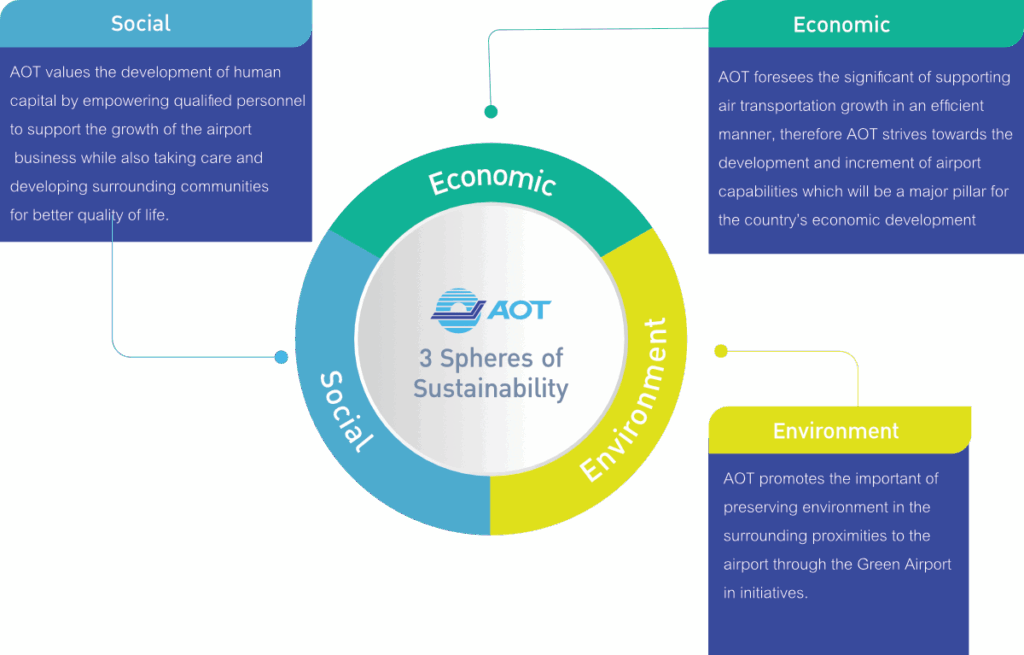
Strategic Implementation Roadmap for Sustainable Development
AOT has established a Strategic Roadmap for Sustainable Development encompassing a five-year timeframe (Fiscal Years 2024-2028) to ensure concrete and systematic implementation. The comprehensive framework comprises the following elements:
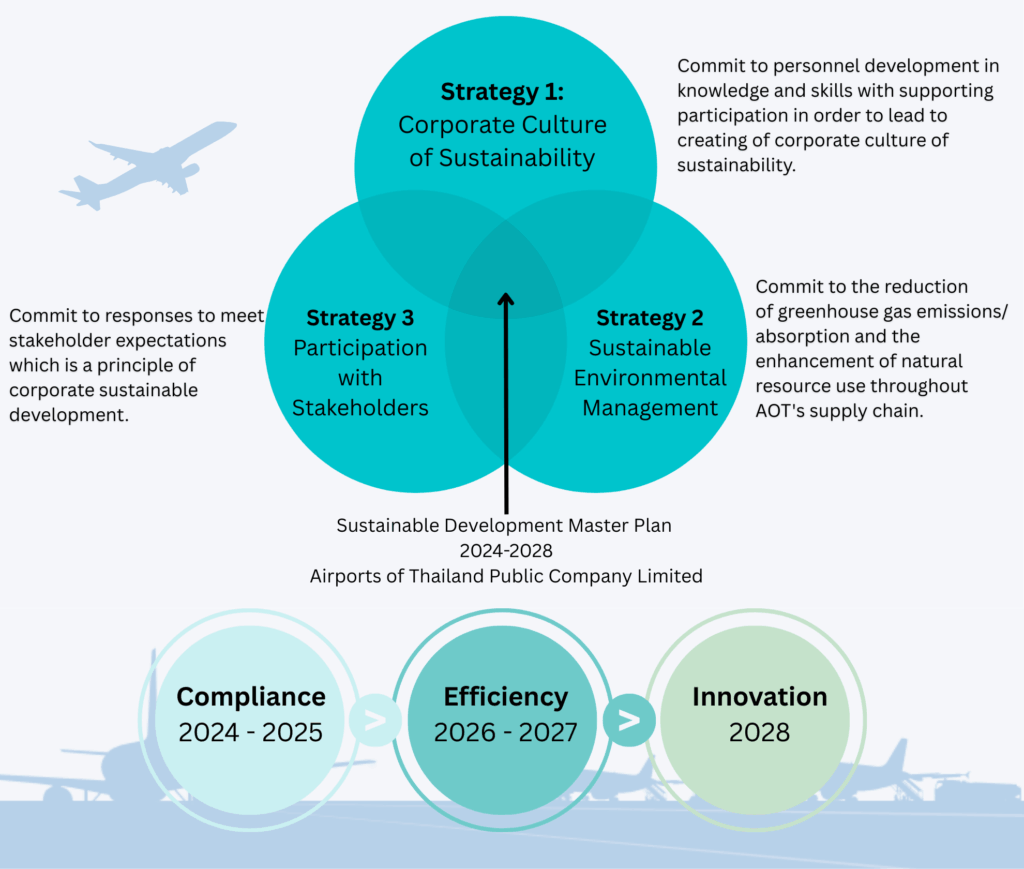
UN Global Compact Enrollment
AOT joined the United Nations Global Compact (UNGC) in 2024, affirming its dedication to fulfilling UN sustainable development goals and propelling business transformation toward sustainability through adherence to the ten globally recognized principles. This commitment manifests through strategic policy development, comprehensive implementation frameworks, and operational excellence across four critical domains: human rights protection, labor practices, environmental responsibility, and corruption prevention.
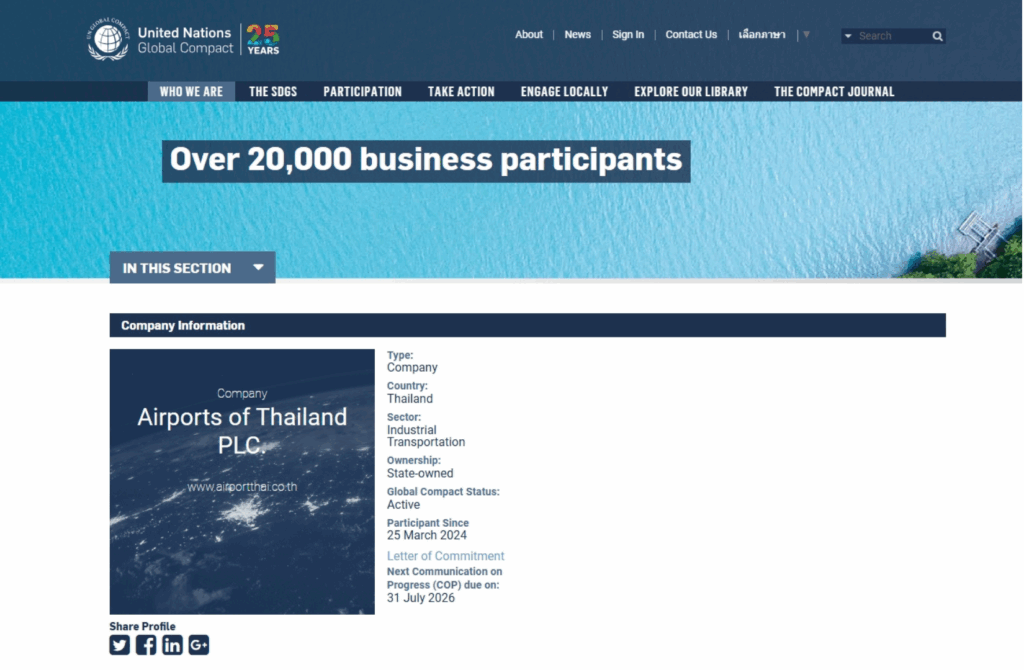
Human Rights
Human Rights
Principle 2: make sure that they are not complicit in human rights abuses.
Labour
Labour
Principle 4: the elimination of all forms of forced and compulsory labour;
Principle 5: the effective abolition of child labour; and
Principle 6: the elimination of discrimination in respect of employment and occupation.
Environment
Environment
Principle 8: undertake initiatives to promote greater environmental responsibility; and
Principle 9: encourage the development and diffusion of environmentally friendly technologies.
Anti-Corruption
Anti-Corruption
AOT's Sustainability Development Objectives
AOT is committed to delivering operational value in alignment with the United Nations' 17 Sustainable Development Goals (SDGs), which serve as a comprehensive framework guiding public sector entities, private enterprises, and non-profit organizations in reassessing and realigning their organizational objectives with SDG targets. AOT has strategically integrated its sustainability management strategies under the AOT Master Plan for Sustainable Development with these goals, transparently disclosing related operational activities for each objective in its annual corporate sustainability reports. Currently, AOT manages and implements projects across various material sustainability issues that address diverse sustainable development goals, as follows:
| Economic and Corporate Governance | |
| Corporate Governance |
SDG 9.1 Develop quality, reliable, sustainable and resilient infrastructure, including regional and transborder infrastructure, to support economic development and human well-being, with a focus on affordable and equitable access for all SDG 16.5 Substantially reduce corruption and bribery in all their forms |
| Business Ethics |
|
| Risk Management |
|
| Digital Technology & Innovations |
SDG 9.1 Develop quality, reliable, sustainable and resilient infrastructure, including regional and transborder infrastructure, to support economic development and human well-being, with a focus on affordable and equitable access for all SDG 9.b Support domestic technology development, research and innovation in developing countries, including by ensuring a conducive policy environment for, inter alia, industrial diversification and value addition to commodities |
| Infrastructure, Airport Capacity and Business Opportunities
|
SDG 8.1 Sustain per capita economic growth in accordance with national circumstances and, in particular, at least 7 per cent gross domestic product growth per annum in the least developed countries SDG 11.2 By 2030, provide access to safe, affordable, accessible and sustainable transport systems for all, improving road safety, notably by expanding public transport, with special attention to the needs of those in vulnerable situations, women, children, persons with disabilities and older persons SDG 17.6 Enhance North-South, South-South and triangular regional and international cooperation on and access to science, technology and innovation and enhance knowledge sharing on mutually agreed terms, including through improved coordination among existing mechanisms, in particular at the United Nations level, and through a global technology facilitation mechanism |
| Supply Chain Management |
SDG 8.1 Sustain per capita economic growth in accordance with national circumstances and, in particular, at least 7 per cent gross domestic product growth per annum in the least developed countries
SDG 8.4 Improve progressively, through 2030, global resource efficiency in consumption and production and endeavour to decouple economic growth from environmental degradation, in accordance with the 10-Year Framework of Programmes on Sustainable Consumption and Production, with developed countries taking the lead SDG 8.7 Take immediate and effective measures to eradicate forced labour, end modern slavery and human trafficking and secure the prohibition and elimination of the worst forms of child labour, including recruitment and use of child soldiers, and by 2025 end child labour in all its forms SDG 8.8 Protect labour rights and promote safe and secure working environments for all workers, including migrant workers, in particular women migrants, and those in precarious employment SDG 12.7 Promote public procurement practices that are sustainable, in accordance with national policies and priorities |
Environment |
| Energy & Climate Change |
SDG 7.2 By 2030, achieve the sustainable management and efficient use of natural resources SDG 7.3 By 2030, double the global rate of improvement in energy efficiency SDG 13.1 Strengthen resilience and adaptive capacity to climate-related hazards and natural disasters in all countries SDG 13.2 Integrate climate change measures into national policies, strategies and planning SDG 13.3 Improve education, awareness-raising and human and institutional capacity on climate change mitigation, adaptation, impact reduction and early warning |
| Environmental Management
(Water and Waste Water Management, Noise Disturbance Impacts, Circular Economy and Biodiversity) |
SDG 6.3 By 2030, improve water quality by reducing pollution, eliminating dumping and minimizing release of hazardous chemicals and materials, halving the proportion of untreated wastewater and substantially increasing recycling and safe reuse globally SDG 6.4 By 2030, substantially increase water-use efficiency across all sectors and ensure sustainable withdrawals and supply of freshwater to address water scarcity and substantially reduce the number of people suffering from water scarcity SDG 6.5 By 2030, implement integrated water resources management at all levels, including through transboundary cooperation as appropriate SDG 11.6 By 2030, reduce the adverse per capita environmental impact of cities, including by paying special attention to air quality and municipal and other waste management SDG 12.4 By 2020, achieve the environmentally sound management of chemicals and all wastes throughout their life cycle, in accordance with agreed international frameworks, and significantly reduce their release to air, water and soil in order to minimize their adverse impacts on human health and the environment SDG 12.5 By 2030, substantially reduce waste generation through prevention, reduction, recycling and reuse SDG 12.6 Encourage companies, especially large and transnational companies, to adopt sustainable practices and to integrate sustainability information into their reporting cycle |
| Social | |
| Customer Satisfaction
|
SDG 11.2 By 2030, provide access to safe, affordable, accessible and sustainable transport systems for all, improving road safety, notably by expanding public transport, with special attention to the needs of those in vulnerable situations, women, children, persons with disabilities and older persons
SDG 16.b Promote and enforce non-discriminatory laws and policies for sustainable development |
| Airport Safety & Security
|
SDG 3.3 By 2030, end the epidemics of AIDS, tuberculosis, malaria and neglected tropical diseases and combat hepatitis, water-borne diseases and other communicable diseases SDG 3.9 By 2030, substantially reduce the number of deaths and illnesses from hazardous chemicals and air, water and soil pollution and contamination SDG 11.2 By 2030, provide access to safe, affordable, accessible and sustainable transport systems for all, improving road safety, notably by expanding public transport, with special attention to the needs of those in vulnerable situations, women, children, persons with disabilities and older persons SDG 11.7 By 2030, provide universal access to safe, inclusive and accessible, green and public spaces, in particular for women and children, older persons and persons with disabilities |
| Occupational Health and Safety
|
SDG 3.3 By 2030, end the epidemics of AIDS, tuberculosis, malaria and neglected tropical diseases and combat hepatitis, water-borne diseases and other communicable diseases SDG 3.9 By 2030, substantially reduce the number of deaths and illnesses from hazardous chemicals and air, water and soil pollution and contamination SDG 8.8 Protect labour rights and promote safe and secure working environments for all workers, including migrant workers, in particular women migrants, and those in precarious employment |
| Human Rights |
SDG 10.2 By 2030, empower and promote the social, economic and political inclusion of all, irrespective of age, sex, disability, race, ethnicity, origin, religion or economic or other status |
| Human Capital Management |
SDG 3.4 By 2030, reduce by one third premature mortality from non-communicable diseases through prevention and treatment and promote mental health and well-being
SDG 4.4 By 2030, substantially increase the number of youth and adults who have relevant skills, including technical and vocational skills, for employment, decent jobs and entrepreneurship SDG 8.5 By 2030, achieve full and productive employment and decent work for all women and men, including for young people and persons with disabilities, and equal pay for work of equal value SDG 8.8 Protect labour rights and promote safe and secure working environments for all workers, including migrant workers, in particular women migrants, and those in precarious employment |
| Information Security & Privacy Protection |
SDG 9.1 Develop quality, reliable, sustainable and resilient infrastructure, including regional and transborder infrastructure, to support economic development and human well-being, with a focus on affordable and equitable access for all |
| Community Involvement
|
SDG 3.3 By 2030, end the epidemics of AIDS, tuberculosis, malaria and neglected tropical diseases and combat hepatitis, water-borne diseases and other communicable diseases SDG 3.4 By 2030, reduce by one third premature mortality from non-communicable diseases through prevention and treatment and promote mental health and well-being SDG 4.1 By 2030, ensure that all girls and boys complete free, equitable and quality primary and secondary education leading to relevant and effective learning outcomes SDG 4.2 By 2030, ensure that all girls and boys have access to quality early childhood development, care and pre-primary education so that they are ready for primary education SDG 4.4 By 2030, substantially increase the number of youth and adults who have relevant skills, including technical and vocational skills, for employment, decent jobs and entrepreneurship SDG 4.5 By 2030, eliminate gender disparities in education and ensure equal access to all levels of education and vocational training for the vulnerable, including persons with disabilities, indigenous peoples and children in vulnerable situations SDG 4.7 By 2030, ensure that all learners acquire the knowledge and skills needed to promote sustainable development, including, among others, through education for sustainable development and sustainable lifestyles, human rights, gender equality, promotion of a culture of peace and non-violence, global citizenship and appreciation of cultural diversity and of culture’s contribution to sustainable development SDG 4.a Build and upgrade education facilities that are child, disability and gender sensitive and provide safe, non-violent, inclusive and effective learning environments for all SDG 7.2 By 2030, increase substantially the share of renewable energy in the global energy mix SDG 8.3 Promote development-oriented policies that support productive activities, decent job creation, entrepreneurship, creativity and innovation, and encourage the formalization and growth of micro-, small- and medium-sized enterprises, including through access to financial services SDG 8.5 By 2030, achieve full and productive employment and decent work for all women and men, including for young people and persons with disabilities, and equal pay for work of equal value SDG 8.9 By 2030, devise and implement policies to promote sustainable tourism that creates jobs and promotes local culture and products SDG 11.6 By 2030, reduce the adverse per capita environmental impact of cities, including by paying special attention to air quality and municipal and other waste management SDG 11.7 By 2030, provide universal access to safe, inclusive and accessible, green and public spaces, in particular for women and children, older persons and persons with disabilities SDG 12.2 By 2030, achieve the sustainable management and efficient use of natural resources SDG 12.b Develop and implement tools to monitor sustainable development impacts for sustainable tourism that creates jobs and promotes local culture and products SDG 14.1 By 2025, prevent and significantly reduce marine pollution of all kinds, in particular from land-based activities, including marine debris and nutrient pollution SDG 15.2 By 2020, promote the implementation of sustainable management of all types of forests, halt deforestation, restore degraded forests and substantially increase afforestation and reforestation globally SDG 17.17 Encourage and promote effective public, public-private and civil society partnerships, building on the experience and resourcing strategies of partnerships |

